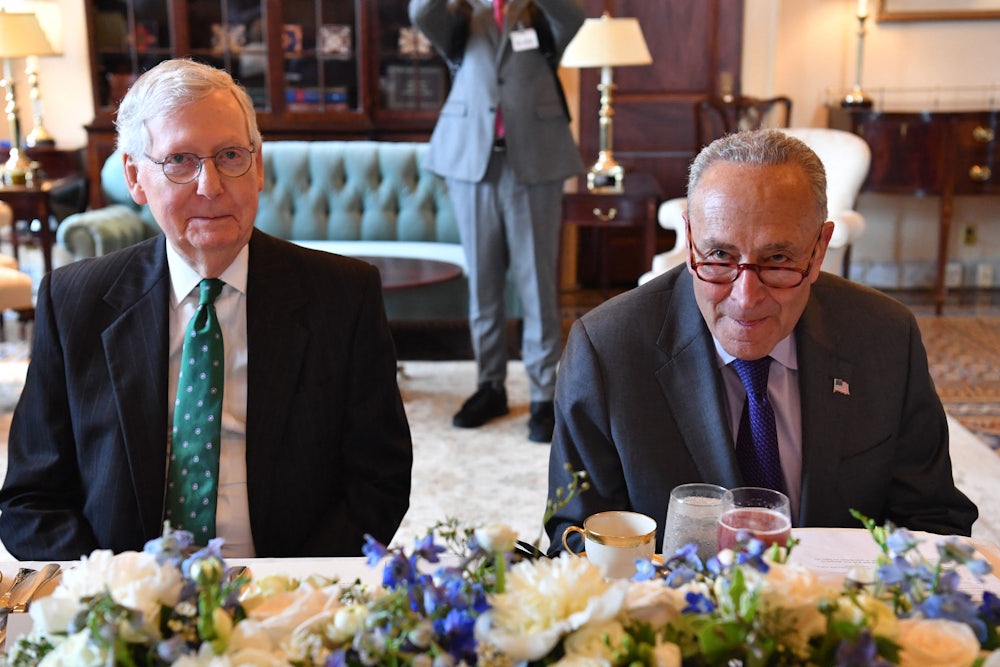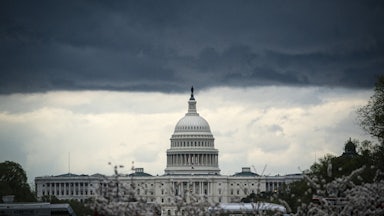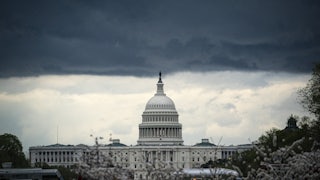The prospect of a massive infrastructure bill that’s mutually agreeable to both parties has become somewhat of a last great hope for bipartisanship in an increasingly rancorous and divided Congress. For over a decade, presidents and Capitol Hill legislators have promised to strike such a deal, and their failure to do so has made them the butt of long-running jokes. But Infrastructure Week may possibly, maybe, arrive in earnest.
On Wednesday, 67 senators—including 17 Republicans—voted to advance a $1 trillion infrastructure bill. “At a time when Washington seems broken, this group of members behind me came together, along with others, and decided that we were going to do something great for our country,” said Senator Rob Portman, the lead Republican negotiator, in a valedictory press conference flanked by the core bipartisan team after the vote on Wednesday evening.
Portman acknowledged the bill still has a long way to go. It must survive several more votes in the Senate, including at least two cloture votes requiring 60 senators to break a potential filibuster. But the fact that the bill advanced at all on Wednesday, let alone with two-thirds of the chamber, indicates that final passage is possible, even probable.
The bill will include $550 billion in new spending, a lower amount than the previously announced $579 billion. The precise details about how the bill will be paid for also appear squidgy, as is often the case with large spending measures. “I feel confident about it,” President Biden told reporters during his trip to Pennsylvania on Wednesday afternoon. His Twitter account made that clear:
It’s infrastructure week. https://t.co/wRCx1ceatN
— President Biden (@POTUS) July 28, 2021
It took more than a month for the bipartisan group to reach the deal. Lawmakers have insisted for weeks that they were close to finalizing the language, but disagreements persisted over methods of funding and the amount spent on priorities such as transit and water infrastructure. A vote to advance the bill last week failed, and a “global offer” proposed by White House officials and Senate Majority Leader Chuck Schumer aiming to address unresolved issues was rejected by Republicans over the weekend. The deal appeared to be on the brink of falling through as late as Monday. But the negotiators and Schumer publicly refused to give up, and the final deal—text excluded—was announced on Wednesday morning.
Six additional Republicans, along with the core five negotiators, had previously committed to voting for the bipartisan bill. Even more ended up signing on, the vote’s passage all but assured once Senate Minority Leader Mitch McConnell announced his support for it.
Based on a commitment from Leader Schumer to Senators Portman and Sinema that the Portman-Sinema amendment to be filed will be the substitute amendment, I will vote to proceed to the bipartisan infrastructure bill.
— Leader McConnell (@LeaderMcConnell) July 28, 2021
But the vote on Wednesday showed some divisions within the Republican Party. Even with McConnell’s endorsement, most Republicans voted against advancing the bill, including several members of Republican Senate leadership. Some Republicans are wary of supporting a bill that doesn’t yet have any text and hasn’t been scored as a whole by the Congressional Budget Office (which may offer a more realistic assessment of how much the bill will cost and whether the proposed revenue streams hold water). Others simply won’t support any legislation that Biden supports.
Former President Trump, still the ostensible leader of the party, issued a statement that seesawed between his signature brute insults and a Washington vernacular that read as if scripted by an adviser.
“Hard to believe our Senate Republicans are dealing with the Radical Left Democrats in making a so-called bipartisan bill on ‘infrastructure,’ with our negotiators headed up by SUPER RINO Mitt Romney,” he said, adding that the deal “is a loser for the USA, a terrible deal, and makes the Republicans look weak, foolish, and dumb.” But then, with the sudden insight of a political strategist, he added that the deal “sets an easy glidepath for Dems to then get beyond what anyone thought was possible in future legislation.” He concluded, as he often does, with threats: “Don’t do it Republicans—Patriots will never forget! If this deal happens, lots of primaries will be coming your way!”
Schumer has also faced potential defections in his own party, particularly on his left flank, as progressives raised concerns about provisions excluded from the bipartisan deal. He had repeatedly put pressure on negotiators to come to an agreement, and aired the potentially quixotic goal of passing both the infrastructure bill and beginning the process for considering a $3.5 trillion reconciliation bill—the American Families Plan—ahead of the August recess.
“My goal remains to pass both the bipartisan infrastructure bill and a budget resolution during this work period,” Schumer said after the vote on Wednesday. “It might take some long nights. It might eat into our weekends. But we are going to get the job done. And we are on track.”
The reconciliation bill is a corollary to the bipartisan bill, and several Democrats have said they would be unwilling to support a bipartisan bill without having the reconciliation bill tacked on to address issues such as health care, childcare, education, and additional climate-related provisions.
“At the end of the day, two pieces of legislation, the bipartisan bill and the budget reconciliation bill, have got to pass both the Senate and the House,” Senator Bernie Sanders told reporters ahead of the vote. “It is my absolute conviction that you’re not going to have a bipartisan bill unless you have a reconciliation bill of three and a half trillion dollars.”
Budget reconciliation is a complicated and arduous process that allows the Senate to pass a bill with a simple majority, instead of reaching a 60-vote threshold. (There will be several roadblocks to getting this bill passed as well, not the least of which is Senate Parliamentarian Elizabeth MacDonough, who has offered Democrats the rare prospect of a second bite at the reconciliation apple during this term but has attached some onerous preconditions.)
Some Democrats have pressed for letting bipartisan negotiations drop and rolling the physical infrastructure priorities into the reconciliation bill, but Schumer has been unwilling to cross that Rubicon. Democratic Senator Joe Manchin, a key moderate, also said this week that “if the bipartisan infrastructure deal falls apart, everything falls apart.” All 50 Democrats are needed to support a reconciliation measure, meaning they can’t afford a single defection.
Like Manchin, Democratic Senator Kyrsten Sinema, the lead Democratic negotiator of the bipartisan bill, has raised concerns about the price tag for a reconciliation bill. She said in a statement on Wednesday that she supported “beginning the process” of reconciliation, meaning that she would likely vote in favor of a budget resolution laying out the instructions for crafting a reconciliation bill, but added, “I do not support a bill that costs $3.5 trillion.”
Assuming that the remaining procedural votes in the Senate go smoothly, and assuming that it passes, only half the battle has been won. Because it then has to be approved in the House.
Democrats have a very narrow majority in the House—just a nine-vote cushion over Republicans. If the bill loses support from progressives who believe that the bipartisan bill does not go far enough, it would need support from a commensurate number of Republicans to pass. Representative Mondaire Jones, a progressive Democrat from New York, tweeted on Wednesday that “without a reconciliation package that meets this moment, I’m a no on this bipartisan deal.”
Representative Alexandria Ocasio-Cortez also fired a shot across the bow on the bipartisan infrastructure deal, aimed directly at Sinema, who has drawn the ire of progressives in recent months for her opposition to eliminating the filibuster.
Good luck tanking your own party’s investment on childcare, climate action, and infrastructure while presuming you’ll survive a 3 vote House margin - especially after choosing to exclude members of color from negotiations and calling that a “bipartisan accomplishment.” 👍🏽👍🏽 https://t.co/0VF8Z73vAa
— Alexandria Ocasio-Cortez (@AOC) July 28, 2021
Even Speaker Nancy Pelosi expressed caution about the bill’s prospects in the House on Wednesday. “I can’t commit to passing something that I don’t know what it is yet,” Pelosi told reporters. “But I’m hoping for the best.”
But it’s unclear whether enough House Democrats would truly unite to torpedo the bipartisan deal. It’s probably the only infrastructure package that could pass the Senate with Republican support, and a major accomplishment for Biden, who spent nearly 40 years in the Senate and prides himself as a dealmaker. The House also goes into recess after this week, so any infrastructure bill passed in the Senate wouldn’t be approved by the lower chamber for a while.
“This has taken a long time, longer than I think any of us expected,” Democratic Senator Mark Warner, one of the chief negotiators, told reporters on Wednesday. And with passage in both houses not totally certain, it’s far from over yet.








